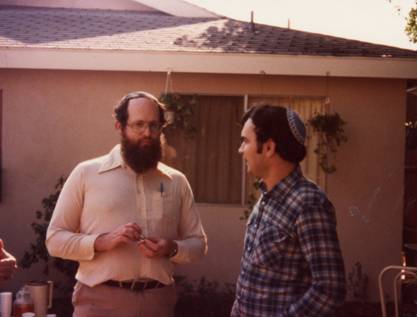The following comment was sent to the BBC as a response to the question out: Are Israel and Hezbollah guilty of war crimes
Hizbolla gets its orders directly from God; regards all non-Muslims as “Dar el Harb” (the house of war); openly calls for the destruction of Israel and calls for the genocide of Jews in Palestine. Putting Israel and Hizbolla in the same basket is the same as a putting Churchill and Hitler in the same basket.
From a letter to Wojtek
Haifa is very quiet. There is almost no traffic and many work places are not functioning: Gaby had to take her car to Jerusalem for ordinary maintenance because her garage in Haifa has been closed for a month now because of the war.
The Technion is open, but only pro-forma. Some faculty, mostly experimentalists, come but most do not. Some graduate students come, but most, especially those with children, do not. Children are terrified by the siren alarms and those unlucky enough to be close to an explosion are, even if not physically hurt, quite terrified and shocked. About one million Israelis from the north have at one point or another been refugees in the south.
The summer semester has been cancelled. The exam period for the spring semester coincided with the start of the war, and once auditoria filled with students, had to be vacated in emergency because of the missiles attacks, it was decided that the Technion was too dangerous to have students assemble anywhere.
The Technion is now pretty empty with no undergraduates. Many of them, I guess, have now been drafted to the army. There are some post docs and I have an especially courageous Czech post doc who decided to stay in spite of the war rather than go back home, while an American student from Brandeis chose to leave.
The north of Israel has been hit by almost 4000 ground missiles, and in towns like Kiryat Shmona, the destruction is widespread, about 10% of the Town was reduced to rubble. The woods of the Galilee are burnt and gone. In Haifa, which has been hit by of order of 200 missiles, the destruction is more localised so you will only see it if you know where to look.
In terms of killing people the rockets are not terribly efficient, the statistics is that almost 100 rockets kill one person. They injure many, of course. But their real effect is terror. They have paralyzed life in north Israel and some people are terrified to the point that they do not function. (I consider being glued to the TV and the Internet as a form of not functioning.)
People are nervous moving about because cars and buses are dangerous during missile attacks. Of course, the probability of a direct hit is rather small, but the probability of an accident or getting killed from shards of glass from a nearby explosion are significant.
I think I understand why people in Europe take the conflict so emotionally and I even pretend to understand why some take the stand they do.
Europeans take the crisis seriously because they recognize its relevance to them as human beings and as Europeans. Beyond the empathy with the human suffering, which is important, there is also a the issue that Europe currently faces an apparently major but in reality minor problem with terror and an apparently minor but fundamentally major problem of an identity crisis. Both trace to the attitude towards Islamists and Islam.
The reason why so many European tend to take the anti-Israeli part is understandable. I probably would do too, if I were European. But I think that Qana is only part of the story. Qana is more of an excuse than a reason.
Europe is for moderation. It is also in Israel’s interest to solve its conflicts without a confrontation. Moderation is normally worth exploring even if its chances of working are slim. Confrontations are financially disastrous and lead to bloodshed and the loss of young life.
Moderation with fundamentalist Islam may just work for Europe, but it will never work for Israel. Ahmadinagad openly calls, in any international forum that he gets invited to, to wipe Israel off the map. And so does Hizbolla. What hope could Israel put in moderation with such parties?
Europe, in contrast, can try and accommodate with Islam to avert the agitation of its large Muslim minorities. When the price to Europe is acceptable and unacceptable to Israel, this only means that Europe and Israel have conflicting interests. Maximizing interest may not be a noble act but it is expedient.
Whose war is it anyway?
From a letter to Vojkan
There are probably many reasons why people who are thousands of miles away from the region react so strongly and emotionally to a conflict in two remote countries. The drama, the graphic images of the destruction, the human suffering, and the terror of war among them. But, I think that there is also another element here which forces many people to view the conflict more intimately. They feel, perhaps instinctively, that the current conflict in the ME is not just a regional conflict between Israel and Lebanon on the fate of two kidnapped soldiers and territorial dispute on the “Sheba farm”. Rather, it is an act in a war that they may become a part of: The war that fundamental Islam with the West.
The current war in Lebanon should not be viewed as an act in the chain of the preceding Israeli-Arab wars in 1948, 1967, 1973 and the Palestinian Intifada of the last ten years. Rather it belongs to the chain of wars in Afganistan, Sudan, Iraq, Pakistan, Indonesia, Algeria and perhaps even Jugoslavia: Regional conflicts that are harnessed to the grand cause of radical Islam. Using the proceeds from the global exports of its oil, Iran is relentlessly exporting the Islamic revolution.
What Israel is painfully learning in Lebanon is that the threats of Ahmadinagad to wipe Israel off the map are not just purple-prose and empty rhetoric. The incitement is backed by the most advanced Russian anti-tank missiles, top of the line of Chinese sea missile and the best arsenal Syria and Iran can offer. But most of all, the tactics and experience of Jihadists from the Afghanistan and the subsequent Islamic wars. Islam is developing and refining effective tactics for the attrition of armies based on Western doctrines.
Should one sacrifice Israel and rescue the rest of the world, or should one confront the evil of fundamental Islam head on. If history is any guide, then the world will first try to sacrifices the minor party to appease the major belligerent.
Sorry for the gloom. Writing is a form of therapy for me.
A view from Haifa
Haifa has an eerie quietness, the quietness at the eye of the storm.
I was born in the 1948 war that Israelis call the war of independence and Palestinians call their Nakba (catastrophe). I have lived through six wars in the Middle East since, and I am particularly depressed by this one.
I feel sad and depressed about the plight of civilians and children on both sides of the border. The fact that the Lebanese are hurt more than Israelis is no comfort to me as an Israeli, and does not lessen the pain. Violence breeds hate which breeds more violence. I do not hate the Lebanese, and do not want them to hate me. But this is not what depresses me most
The reason I am depressed is that the current conflagration in the middle-east is not anymore a conflict between two nations that have a limited dispute. The outstanding issues between Israel and Lebanon, the prisoners and border disputes, are not the root cause of this war. The root cause of the war is ideological: The HizbAlla view that the annihilation and destruction of Israel is a binding religious duty.
Southern Lebanon appears to be yet a new front opened by extreme Islam, against Israel in the present case but against the rest of the non-muslims eventually.
Muhamed and his followers ruled much of the civilized world by the sward, and were displaced by the West when the sword proved to be no match to the firearms. What we now witness is an attempt to bring back the glorious days of Islam. Ever since Afganishtan, conventional armies seem to have no strategy to deal with religious and state sponsored terror with ballistic missiles and nuclear ambitions.
My mother was born in a small town in Austria in 1922. As a child in Austria she was told by local anti-semites to go to Palestine because Europe is not for Jews. Now, almost a century later, my son, who is 12 years old, hears similar statements from the neo-antisemites like the president of Iran, Ahmadinagad: Jews you have no place in the Middle-East. Go back to Europe, where you belong. Israel should be wiped off the map. Jews are once again blamed to be the root cause of all problems of the world.
My grandparents and aunts, along with six million European Jews, were massacred in Auschwitz. A catastrophe brought about by the Nazi ideology of hatred. Now, half a century later, we face a new hatred ideology, extreme Islamism, and a new Hitler, in the image of Ahmadinagad.
From a letter to Aya
The wolrd is not getting any safer and the Islamists seem to have learned a few things in Afganistan so that fighting them gets more difficult and bloody, especially since they do not seem to have any problem with dying
From a letter to Jurg
I agree with you that the world is changing, and not for the better. Perhaps this is just a sign of us getting old, but I am afraid that there is more to it than that and that the world we leave to our children is less hospitable and safe. The age of reason and moderation, law and order, appears to be a fading memory of the past and the future looms with religious fanaticism, terror, intolerance and chaos. In short, barbarism.
From a letter to Joel
Since you have asked, here is my view of the situation.
A good Bazaari knows that he struck a good deal when the customer is recalled. Ahmadinagad, Iran’s president, is a good Bazaari and a master of brinkmanship. (You can see this in the way he handles the Iran Nuclear issue.) Brinkmanship is also what his proxy in Lebanon, Hasan Nassralla (literally the victory of God), is exercising. By challenging Israel the charismatic Nasralla builds popularity, leverage and stature in Lebanon and among the Arabs and Palestinians. He is probably the most popular Arab leader today.
Israel has no choice but to set boundaries and limits. If Nassalla was allowed to use the kidnapped soldiers to negotiate the release of Palestinian and Lebanese prisoners in Israel, this will only embolden him to repeat hijacking and escalate them. This is a never ending cycle because in the his views, shared by many Islamists, there is no legitimacy to Israel whatsoever and Jewish existence in this region, in any form, is a blasphemy.
At the same time, Israel needs to walk the fine line between not doing too much and not doing too little. Doing too much may further weaken the Christians and Sunnis in Lebanon and doing too little would embolden and strengthen the Islamists Shia.
The overall prospects are bleak in any case since Islamism is endemic in the region and the crisis we witness is but one episode in a global chain of development that is really beyond the control of a minor player like Israel.: The Tsunami of Islamism which started with the Iranian revolution, went on through 9/11, and is corroding Afghanistan and Iraq, is a global phenomenon. It will not be abated by the consequences of one regional conflict although it may gain or lose momentum by it.
The world is changing, and not for the better. This is not just us getting old. The age of predictability, law and order, which characterized the post WWII period appears to be a fading memory of the past. The future looms with religious fanaticism, terror, unpredictability, intolerance and chaos. In short, barbarism.


 My Rabbi Barry
My Rabbi Barry